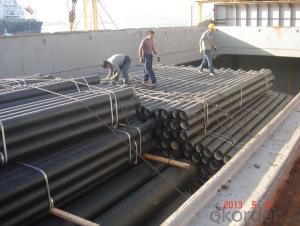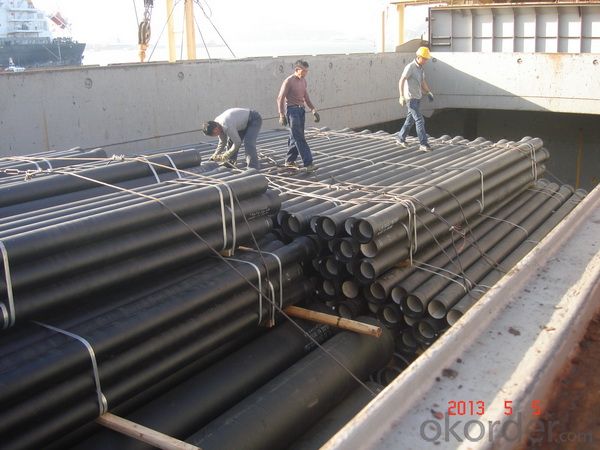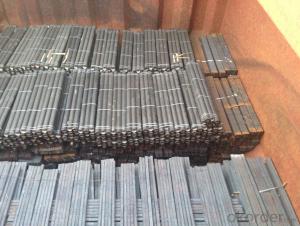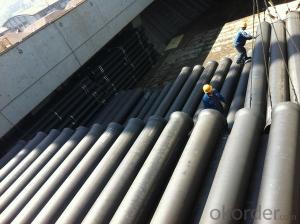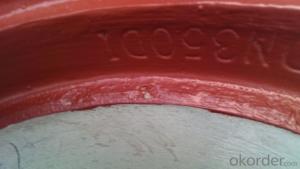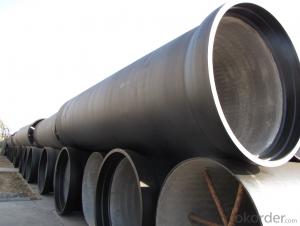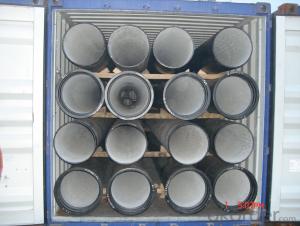ductile iron pipeDN150 C40 Socket Spigot pipe
- Loading Port:
- Tianjin
- Payment Terms:
- TT OR LC
- Min Order Qty:
- 25 m.t
- Supply Capability:
- 30000 m.t/month
OKorder Service Pledge
OKorder Financial Service
You Might Also Like
Specification:
1) The standard of pipe: ISO2531:1998, K9
2) Effective length: 6m
3) Inner cement line: Portland cement line as per ISO4179
4) Zinc coating: at least 130g/m2 as per ISO8179
5) Bitumen painting: at least 70um as per ISO8179
6) With 100% quantity of NBR ring, or SBR ring, or EPDM ring as per ISO4633
7) DN80mm-800mm
8) High strength, lighter than grey iron, good corrosion resistance, no furring, small flow resistance, easy fixing, long life tome about 100 yeas
9) Produced by Hangzhou chunfeng machine
10) Checked by automatic inspection equipment
11) Composition:
Chemical composition | ||||||
Chemical composition | Ductile Cast Iron Pipe (%) | Grey iron pipe (%) | Steel pipe (%) | |||
C | 3.5-4.0 | 3.2-3.8 | 0.1-0.2 | |||
Si | 1.9-2.6 | 1.4-2.2 | 0.15-0.4 | |||
Mn | 0.15-0.45 | 0.4-0.6 | 0.3-0.6 | |||
P | ≤0.06 | ≤0.3 | 0.02-0.03 | |||
S | ≤0.02 | ≤0.1 | 0.02-0.03 | |||
Mg | 0.03-0.06 | |||||
12) Feature:
Mechanical properties | ||||||
Ductile Cast Iron Pipe | Grey Iron Pipe | Steel Pipe | ||||
Tensile Strength(Mpa) | ≥420 | 150-260 | ≥400 | |||
Yield Strength(Mpa) | ≥300 | No Confirmation | No Confirmation | |||
Bending Strength(Mpa) | ≥590 | 200-360 | ≥400 | |||
Elongation (%) | ≥10 | Neglected | ≥18 | |||
Brinell Hardness(HBS) | ≤230 | ≤230 | About 140 | |||
13) T type mechanical joint
14) Packing: in bulk or container
- Q: What is the internal lining used in ductile iron pipes?
- The internal lining used in ductile iron pipes is typically a cement mortar lining.
- Q: Are there any special coatings or linings used for ductile iron pipes?
- Yes, there are special coatings and linings used for ductile iron pipes. These coatings and linings are applied to the interior and exterior surfaces of the pipes to protect them from corrosion and extend their lifespan. Some common coatings and linings used for ductile iron pipes include cement mortar lining, polyethylene encasement, fusion bonded epoxy (FBE) coating, and polyurethane lining. Cement mortar lining is commonly used to provide a protective layer on the inside of ductile iron pipes. It is a mixture of cement, sand, and water that is applied to the pipe's interior surface. Cement mortar lining helps prevent corrosion caused by the water or other fluids flowing through the pipes. Polyethylene encasement is another protective coating used for ductile iron pipes. It involves wrapping the pipes with a layer of polyethylene material, which provides a barrier against environmental factors and prevents direct contact between the pipe and the surrounding soil, reducing the risk of corrosion. Fusion bonded epoxy (FBE) coating is a thermosetting epoxy powder coating that is applied to the exterior of ductile iron pipes. It provides excellent corrosion resistance and mechanical protection to the pipes. FBE coating is often used in aggressive environments where the pipes are exposed to chemicals or high moisture conditions. Polyurethane lining is a type of lining used for ductile iron pipes that offers excellent resistance to both corrosion and abrasion. It is applied as a liquid polymer lining that is sprayed onto the interior surface of the pipes. Polyurethane lining provides a smooth and durable protective layer that helps extend the life of the pipes. These coatings and linings play a crucial role in maintaining the integrity and longevity of ductile iron pipes, ensuring their performance in various applications such as water distribution, wastewater management, and industrial processes.
- Q: Do ductile iron pipes require cathodic protection?
- Indeed, cathodic protection is necessary for ductile iron pipes. Employing this technique safeguards metallic structures against corrosion by designating them as the cathode in an electrochemical cell. Ductile iron pipes face a high susceptibility to corrosion, particularly in harsh soil environments or when exposed to water that harbors substantial amounts of corrosive elements like chlorides or sulfates. By subjecting the pipe to a direct electrical current, cathodic protection effectively thwarts the innate corrosion process. This approach guarantees the durability and soundness of the ductile iron pipes, thereby diminishing the frequency of repairs or replacements.
- Q: Are ductile iron pipes suitable for underground parking structures?
- Yes, ductile iron pipes are suitable for underground parking structures. Ductile iron pipes are known for their strength and durability, making them an ideal choice for underground applications where they may be subjected to heavy loads or potential impacts. Additionally, ductile iron pipes have excellent corrosion resistance, which is crucial in underground environments where they may be exposed to moisture and other corrosive elements. The high tensile strength and flexibility of ductile iron pipes also allow them to withstand ground movements and settle without cracking or breaking, further enhancing their suitability for underground parking structures. Overall, ductile iron pipes provide a reliable and long-lasting solution for the drainage and water supply needs of underground parking facilities.
- Q: Are ductile iron pipes suitable for bridge crossings?
- Yes, ductile iron pipes are suitable for bridge crossings. They have high strength and durability, making them capable of withstanding heavy loads and providing reliable support for transportation infrastructure. Additionally, ductile iron pipes have excellent corrosion resistance properties, which is crucial for bridge crossings exposed to various weather conditions and potential water exposure.
- Q: Ductile iron pipe connection mode
- Jack painted on the outer surface and rubber lubricant: lubricant evenly installed ring inner surface, outer surface coating in the socket to socket socket parts lubricant line all the brush in the socket.
- Q: How do ductile iron pipes handle differential settlement?
- Ductile iron pipes have the ability to handle differential settlement due to their inherent flexibility and strength. The material's ductility allows the pipes to withstand minor ground movements and settlement without causing significant damage or failure. The pipes can flex and adjust to the changing ground conditions, reducing the risk of cracks or breaks. Additionally, the inherent strength of ductile iron pipes helps distribute the load evenly, minimizing the impact of settlement on the overall integrity of the pipeline system.
- Q: Can ductile iron pipes be used for rainwater harvesting systems?
- Yes, ductile iron pipes can be used for rainwater harvesting systems. Ductile iron pipes are known for their durability and strength, making them suitable for various applications, including rainwater collection and storage. They can effectively transport rainwater from collection points to storage tanks, ensuring a reliable and efficient rainwater harvesting system.
- Q: How is ductile iron pipe different from other types of pipes?
- Ductile iron pipe is different from other types of pipes primarily due to its superior strength and durability. Unlike traditional cast iron pipes, which are more brittle and prone to cracking, ductile iron pipes are highly resistant to impact and can withstand higher pressure. Additionally, ductile iron pipes have the advantage of being more flexible and easier to install, making them a preferred choice for various applications such as water and sewage systems.
- Q: Is the crankshaft material forged or ductile iron?
- Other crankshafts are not clear about the car crankshaft. These two materials are useful, but the trend is to use ductile iron
Send your message to us
ductile iron pipeDN150 C40 Socket Spigot pipe
- Loading Port:
- Tianjin
- Payment Terms:
- TT OR LC
- Min Order Qty:
- 25 m.t
- Supply Capability:
- 30000 m.t/month
OKorder Service Pledge
OKorder Financial Service
Similar products
Hot products
Hot Searches
Related keywords
